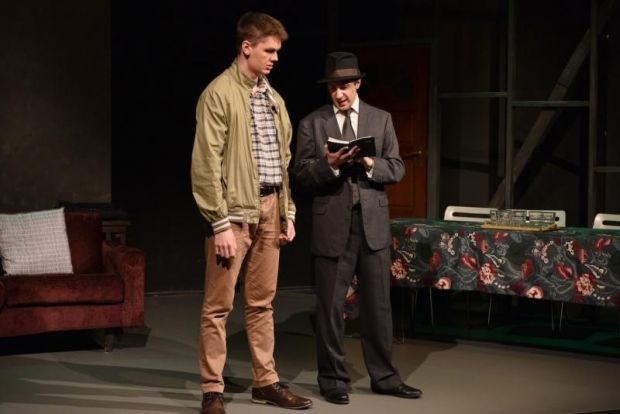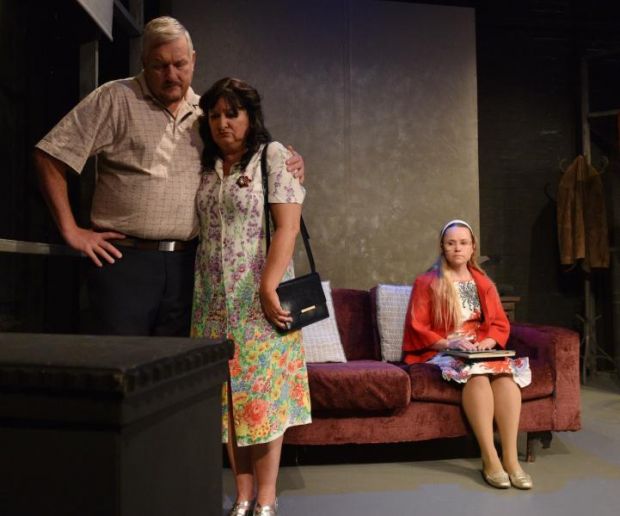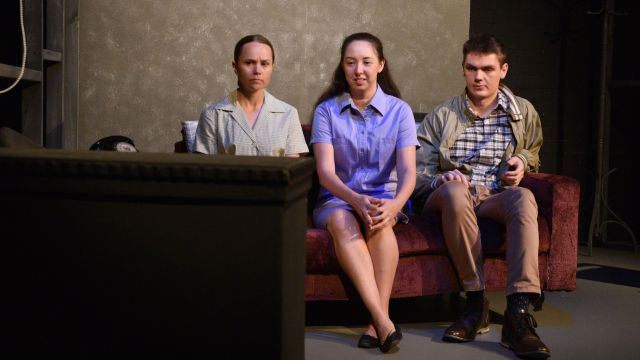The Spook
Inspired by a true story, this play is set in small-town Australia in 1965. There are references to Menzies and Vietnam to give us some historical context, and meetings held for the South Bendigo branch of the Communist Party of Australia to give us a grounding in suburbian Victoria. Apparently the Cold War fear-mongering, unfortunate friendships and betrayal which are highlighted in this play were alive and well in regional Australia in the 1960’s, and that is both interesting and disappointing.
Essentially, an unassuming young man, Martin Porter, is plucked from his ordinary life and asked by an ASIO recruiter to act as a mole within the local branch of the Communist party. His instructions are to infiltrate the group, spy on his new ‘comrades’ and then dictate as much detail as possible into a tape recorder.

Playing the pivotal role of Martin here is newcomer Cameron Drake. I say pivotal because he delivers an unusually large percentage of the dialogue and barely leaves the stage. Drake has a strong background in musical theatre but this is his first play and his first lead role and all things considered he’s done an amazing job. He delivers his dialogue with conviction, never drops out of character and when he loses his composure in Act 2 it really highlights the range of his acting skills.
As Martin becomes further entrenched in the Party, these comrades become his close friends and he starts to question why he’s spying on them and reporting their trusted secrets to the government. These friends include Greek couple George and Eli Tassakis, played by Nathan Heinrich and Kate Kelly. These two make a believable couple with Heinrich showing the warmth you expect from a European family man and Kelly being feisty at times while doing a great job of maintaining her accent.

Other Party members include Frank Nash, the bossy chair of the meetings and Phyllis, his better half. Nash is brought to life by Rawdon Waller who fills his character with all of the self-importance and short temper that you would expect from someone who is trying to keep a stranglehold on the group. Phyllis is long-suffering and tries to be supportive despite Frank’s angry persona. Phyllis is played by Courtney Farrow who also doubles as Trixie Porter, Martin’s mother. This is fortunate for Farrow because Phyllis is a bit one-dimensional whereas the character of the mother gives Farrow a lot more room to flex her acting muscles. The scene towards the end when she is not at all well is particularly moving.
Brett Joachim is cast as Alex, the ASIO mentor who is very goal focussed and doesn’t care at all if Martin’s new friends have their lives destroyed or if indeed Martin himself is upset by these circumstances which, in his naivety, he unknowingly contributed to. Joachim is appropriately cocky and clearly shows that the character Alex has no conscience because everything can be justified when you look through the lens of “there might be something you can do for your country”.

Last but certainly not least is Tida Dhanommitrapap who successfully navigates three different roles. She is Annette (Martin’s partner), Jean (a Party member) and finally a Policewoman as the play nears its conclusion. Though she is convincing in all three roles, one can’t help but wonder whether splitting these roles across two or even three different actors would garner a better result. If nothing else it would eradicate the need for panicked costume changes, help to distinguish the characters of Annette and Jean from each other more clearly and of course, more actors on stage equates to more cast-driven ticket sales.
These seven actors have a tough road to hoe with this material. Unfortunately Act 1 feels a bit laboured as there is a lot of information and intricacy shoe-horned into it and it seems to be very long. This is a shame because the actors kept up a professional pace and the scene changes were faster than Superman in a phone booth. If Act 1 could somehow be trimmed and/or revised a little it would be easier to hold the audience’s undivided attention plus we’d get to the satisfying and more exciting Act 2 a little more quickly.

That notwithstanding, the production itself is successful; the set is cleverly multi-functional given the limitations of the space, the sound effects and lighting are all perfectly cued and the costumes reflect middle-class Australian suburbia nicely. Sadly however, Act 2 seems to wrap up very quickly and one collective bow is done and dusted just like that. While I appreciate the relevance of a single, company bow after an ensemble play where there’s a more equal distribution of stage time, a company bow after this performance felt very unfair. This play is so heavily skewed towards the narrative and lived experience of the central character Martin that Drake should have been given a solo bow after the other characters. The quick, collective bow seemed to disrespect the enormity of his role and the correspondingly higher amount of effort that he would have had to put in throughout the rehearsal period.
The Spook will play at the traditional home of the Pymble Players until the 8th of June. Book your tickets now and enjoy this play in the ambience of the intimate space.
Fiona Kelly
Subscribe to our E-Newsletter, buy our latest print edition or find a Performing Arts book at Book Nook.

